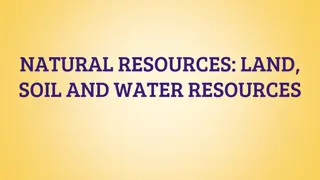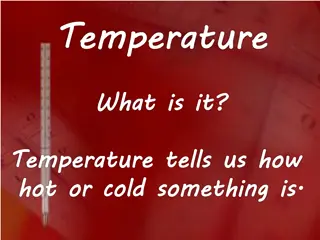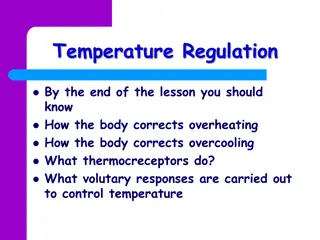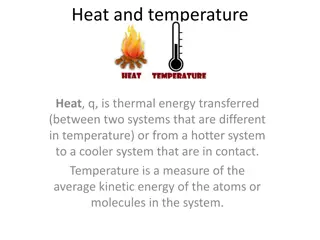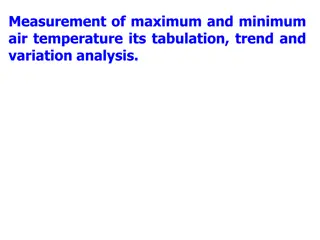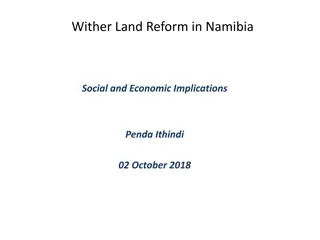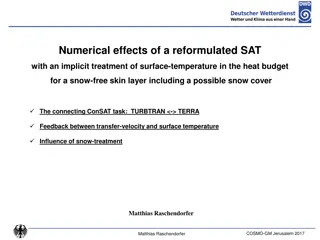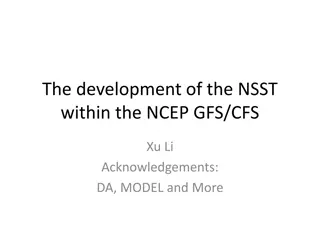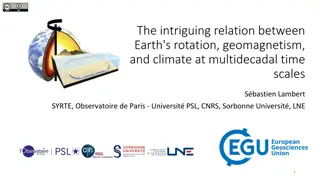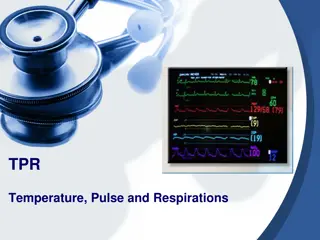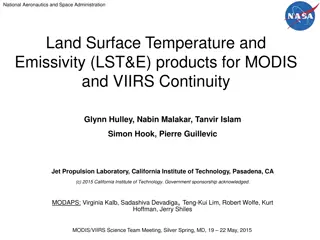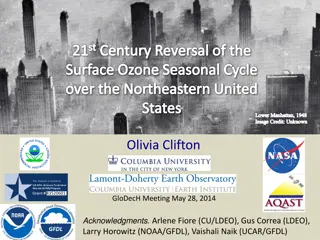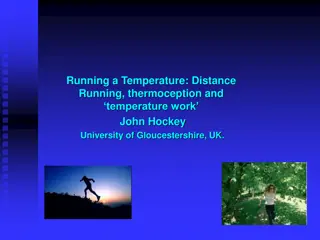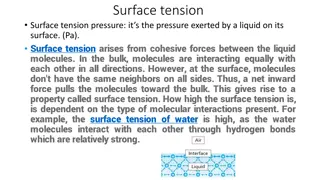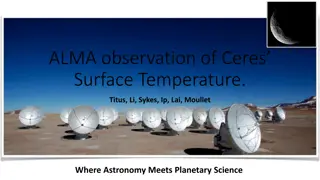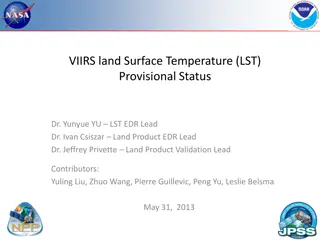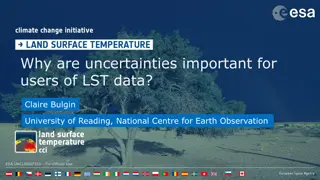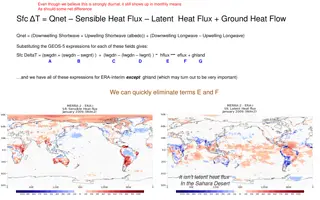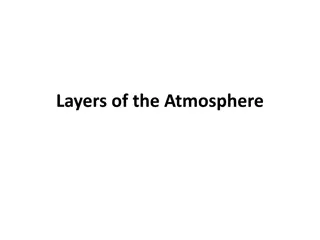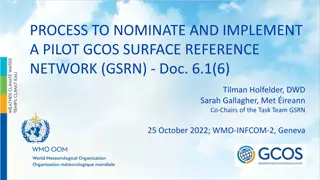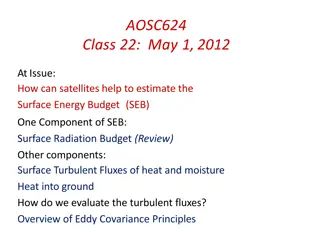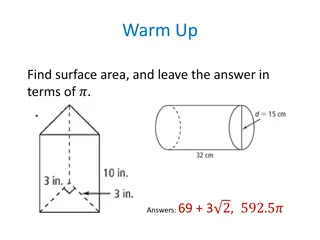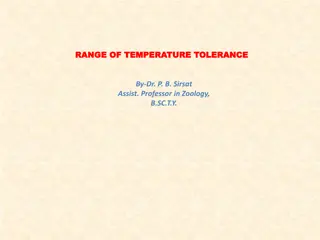Understanding Temperature Distribution and Differences in Heat
Explore the distribution of temperature across latitudes and elevations, and learn about the difference between heat and temperature. From horizontal to vertical variations, discover how factors like latitude influence temperature distribution patterns globally. Gain insights into the fundamental co
11 views • 19 slides
Understanding Runoff in Surface Water Systems
Runoff, the flow of precipitation and other contributions in surface streams, plays a crucial role in watershed systems. It encompasses various sources such as surface runoff, interflow, and base flow. Surface runoff, which travels over the ground surface to channels, is influenced by factors like s
1 views • 27 slides
Understanding Land, Soil, and Water Resources
Natural resources such as land, soil, and water are crucial for human activities. Land comprises the lithosphere and is utilized for various purposes based on land use patterns. The study of land use patterns is essential for economic planning, as the availability of land is limited, leading to conf
5 views • 25 slides
Exploring Temperature: Facts, Measurement, and Scales
Understanding temperature is crucial in daily life. This content delves into the definition, measurement, and scales of temperature, highlighting key facts such as body temperature, freezing and boiling points of water, and extreme temperatures like those found in lightning and the sun. Discover how
1 views • 9 slides
Understanding Temperature Effects on Donor and Acceptor Ionization in Semiconductors
Temperature plays a crucial role in the ionization of donor and acceptor atoms in semiconductors. In N-type semiconductors, the Fermi level lies below the conduction band, while in P-type semiconductors it lies above the valence band, with the position depending on temperature and impurity atoms. Do
1 views • 13 slides
Understanding Body Temperature Regulation
Explore how the body maintains its internal temperature through mechanisms such as correcting overheating and overcooling, the role of thermoreceptors, and voluntary responses that help control temperature. Discover the importance of regulating internal body temperature for optimal enzyme-catalyzed
2 views • 18 slides
Understanding Ocean Currents and Effects
Ocean currents play a crucial role in the movement of water across the Earth's surface. Wind-driven surface currents, influenced by the Coriolis effect, move water horizontally and impact climate patterns worldwide. Major currents extend deep below the surface and can move rapidly, while rip current
0 views • 14 slides
Understanding Heat and Temperature in Thermodynamics
Thermal energy transfer, heat, and temperature play crucial roles in determining the behavior of systems in terms of kinetic energy and molecular motion. The zeroth law of thermodynamics establishes the relationship between heat and temperature. Heat transfer leads to changes in the average kinetic
8 views • 8 slides
Understanding Temperature Measurement in Plant Growth
Exploring the measurement of maximum and minimum air temperature, its significance in analyzing trends and variations, and how temperature impacts plant growth stages. The optimal temperature ranges for different plant species and the importance of maximum and minimum temperature recordings using sp
0 views • 20 slides
Land Governance in Malawi: Challenges and Progress
Malawi's land governance system has evolved significantly since the colonial era, with a framework that includes institutional and legal aspects. The country has faced challenges in managing land disputes, valuation, taxation, and public land use. The institutional setup involves the central governm
0 views • 23 slides
Understanding Surface Tension in Physical Pharmacy Lab
Surface tension is a crucial concept in physical pharmacy lab dealing with gas-solid or gas-liquid interfaces. It refers to the force per unit length required to balance the inward pull on the surface. Interfacial tension, cohesive forces, and adhesive forces play significant roles in determining su
0 views • 16 slides
Implications of Land Reform in Namibia: Social and Economic Insight
Land reform in Namibia is crucial for inclusive growth and shared prosperity, with access to land being a key factor. Productive land usage can lead to wealth creation and social development. The importance of agriculture in the economy is highlighted, along with the need for skilled farmers and a s
0 views • 7 slides
Numerical Effects of Reformulated SAT with Implicit Surface Temperature Treatment
This study investigates the impacts of a reformulated SAT on the heat budget of a snow-free surface layer, particularly considering snow cover effects. The ConSAT task involves understanding the feedback between transfer velocity and surface temperature. The research aims to address issues related t
2 views • 20 slides
Understanding Near-Surface Sea Temperature Development in NCEP GFS/CFS
This informative piece delves into the evolution of Near-Surface Sea Temperature (NSST) within the NCEP GFS/CFS, discussing its significance in Numerical Weather Prediction (NWP) systems, the utilization of sea surface temperature (SST), and the T-profile near the sea surface. It covers the role of
0 views • 28 slides
The Intriguing Relationship Between Earth's Rotation, Geomagnetism, and Climate
High correlations between Earth's rotation and climate variables have been observed at multidecadal time scales, sparking questions about a common origin. This study explores the potential causality between geomagnetism, length-of-day variations, and climate, searching for significant correlations a
0 views • 8 slides
Understanding Atmosphere-Ocean Coupling in Madden-Julian Oscillation
Atmosphere-ocean coupled processes in the Madden-Julian Oscillation (MJO) play a crucial role in intraseasonal oscillations. This paper review by Shao Yun-Chuan explores how the ocean's Sea Surface Temperature (SST) influences surface fluxes, MJO convection, and energy balance dynamics. It delves in
0 views • 17 slides
Understanding Temperature Measurement in Healthcare
Temperature, Pulse, and Respirations are vital signs used to assess a patient's health. Temperature can be measured through various methods such as oral, rectal, axillary, tympanic, and temporal routes using different types of thermometers. It's important to know the normal temperature ranges for di
3 views • 39 slides
NASA MODIS and VIIRS Land Surface Temperature and Emissivity Products Overview
Explore NASA's MODIS and VIIRS continuity products for monitoring land surface temperature and emissivity. Learn about MODIS/VIIRS LST&E updates, new VIIRS products, and the MODIS-VIIRS continuity effort. Dive into error dependencies, algorithms, band emissivity, and uncertainty estimates provid
0 views • 43 slides
Surface Ozone Seasonal Cycle Reversal Study in Northeastern United States Lower Manhattan
Study on the reversal of the surface ozone seasonal cycle over Northeastern United States Lower Manhattan, analyzing the impact of NOx and VOC emissions on Surface O3 levels. Research shows a 26% decrease in regional NOx emissions leading to changes in the seasonal cycle of surface ozone concentrati
0 views • 24 slides
The Phenomenology of Temperature Awareness in Distance Running
Researchers at the University of Gloucestershire explore the embodied consciousness of distance runners, focusing on thermoception and temperature regulation. Utilizing sociological phenomenology and phenomenological ethnography, the study delves into the sensory experiences of runners, emphasizing
0 views • 29 slides
Exploring Temperature: From Touch to Thermometer
Explore the concept of temperature in Year 4 lesson 1, understanding that touch is not always accurate in judging temperature. Engage in activities to test different temperatures and discover the limitations of using the sense of touch. Lesson 2 introduces using a thermometer to measure temperature
0 views • 43 slides
Understanding Surface Tension in Physical Pharmacy Lab
Surface tension is a critical aspect in physical pharmacy lab experiments, involving the study of forces at gas-solid or gas-liquid interfaces. It is the force per unit length required to counterbalance the net inward pull on a surface. The concept extends to interfacial tension, cohesive and adhesi
0 views • 21 slides
Understanding Surface Tension: Properties, Measurement Methods, and Calculations
Surface tension is the pressure exerted by a liquid on its surface due to cohesive forces among molecules. The measurement methods include the liquid rise in a capillary tube technique, drop weight method, and bubble pressure method. The surface tension coefficient can be calculated using the equati
0 views • 12 slides
Comprehensive Solution for EU Digital COVID Certificate Verification
This solution offers face recognition, temperature monitoring, and verification of EU Digital COVID Certificates for personnel. It includes products like DHI-ASI7213X-V1-T1 and ASF172X-T1, with various unlocking modes and support for certificate verification. The system allows for accurate and fast
0 views • 7 slides
ALMA Observation of Ceres Surface Temperature
ALMA conducted ground-based observations of Ceres' surface temperature providing valuable insights for planetary science. The data processing steps involved models interpolation, radio calibration, and thermal gradient correction to produce thermal flux maps. Key objectives included detecting the ed
0 views • 9 slides
VIIRS Land Surface Temperature (LST) Calibration Approach and Data Analysis
The VIIRS Land Surface Temperature (LST) Provisional Status project, led by Dr. Yunyue Yu, focuses on improving the LST EDR through algorithm coefficient updates and calibrations. The calibration process involves regression steps and comparisons with reference datasets like MODIS Aqua LST. Various c
0 views • 29 slides
Low Temperature Thermometry Overview
Temperature measurement, known as thermometry, involves assessing local temperature levels for various applications. A good low-temperature thermometer should offer reproducibility, high sensitivity, and a wide operating range. Primary thermometers directly measure properties of matter, while second
0 views • 25 slides
Understanding Temperature Measurement in Mechanical Engineering
Exploring the concepts of temperature measurement in mechanical engineering, this article covers topics such as temperature scales, the ideal-gas thermometer, and the relationship between temperature and heat. With detailed explanations and visual aids, it provides insights into how temperature is m
0 views • 25 slides
Importance of Land Records in Preventing Land Disputes
Land records play a crucial role in documenting ownership, facilitating land-related transactions, and preventing costly litigation. They serve as a lifeline for effective governance and provide legal status to landowners, ensuring clarity and transparency in land ownership. Without proper land reco
0 views • 15 slides
Impact of Land Policies in Georgia: Headright System, Land Lotteries, and Yazoo Land Fraud
Georgia pursued various land policies post-Revolutionary War to allocate land obtained from Native Americans. The headright system granted land to soldiers and white men, aiming to boost population and state power. Land lotteries distributed land through random draws. The Yazoo land fraud scandal ta
0 views • 20 slides
5 Steps Questionnaire on Mapping Land Degradation and Sustainable Land Management
Preparation for mapping land degradation and sustainable land management involves steps such as preparing the base map, identifying contributing specialists, assessing land use systems, understanding land degradation types, and providing expert recommendations. The process includes analyzing area tr
0 views • 32 slides
Importance of Uncertainties in Land Surface Temperature Data Analysis
Uncertainties play a crucial role for users of Land Surface Temperature (LST) data as they help in understanding the degree of doubt in measured values. Claire Bulgin from the University of Reading emphasizes the difference between error and uncertainty, highlighting the necessity of considering unc
0 views • 14 slides
Analysis of Surface Temperature and Heat Flux Relationships
Exploring the interplay between surface temperature, sensible heat flux, latent heat flux, and ground heat flow, utilizing data from GEOS-5 and ERA-interim models to understand the impact of different heat flux components on surface temperature variations in diurnal cycles and monthly means. Compari
0 views • 8 slides
Exploring Layers of Earth's Atmosphere
Earth's atmosphere consists of five major layers, each with unique properties and temperature changes with altitude. The troposphere, closest to the Earth's surface, experiences a temperature decrease with altitude due to heat from the sun and Earth's surface. Learn about the properties of the tropo
0 views • 26 slides
Understanding Surface Chemistry and Adsorption Phenomenon
Surface chemistry explores the interactions that occur at surfaces and interfaces, with adsorption being a key phenomenon. Adsorption involves the concentration of molecules on a surface, with adsorbents and adsorbates playing crucial roles. Desorption, the opposite process, removes adsorbed substan
1 views • 21 slides
Establishment of GCOS Surface Reference Network (GSRN) Pilot Phase
The establishment of the GCOS Surface Reference Network (GSRN) Pilot Phase aims to improve the accuracy, stability, and comparability of surface observations for Essential Climate Variables (ECVs). The GSRN will serve as the reference network for surface observations, providing data traceability and
0 views • 7 slides
Changes in Viscose Fabric Surface Morphology Due to Sunlight Exposure
This study explores the impact of sunlight exposure on the surface morphology of viscose fabrics. Direct exposure to sunlight for 120 days during summer showed significant changes in fiber surface depressions. The observed damage in mechanical properties correlated with alterations in surface morpho
0 views • 11 slides
Satellite Applications in Estimating Earth's Surface Energy Budget
Satellites play a crucial role in estimating the Surface Energy Budget (SEB) by providing data on various components such as Surface Radiation Budget and Surface Turbulent Fluxes. The SEB includes factors like net radiation flux, sensible and latent heat fluxes, and subsurface heat transfer. Satelli
0 views • 38 slides
Geometry Concepts for Surface Area Calculations
Explore various geometric shapes such as pyramids and cones to calculate surface area. Learn the differences between prisms and pyramids, understand the importance of altitude and slant height in pyramids, and differentiate between lateral and surface areas. Practice finding lateral and surface area
0 views • 16 slides
Temperature Tolerance of Organisms in the Universe
Life on Earth exists within a range of temperatures, with organisms displaying varied temperature tolerance. Eurythermal organisms can withstand large temperature fluctuations, while stenothermal organisms tolerate only small variations. The temperature range for each species is crucial for their ph
0 views • 8 slides


